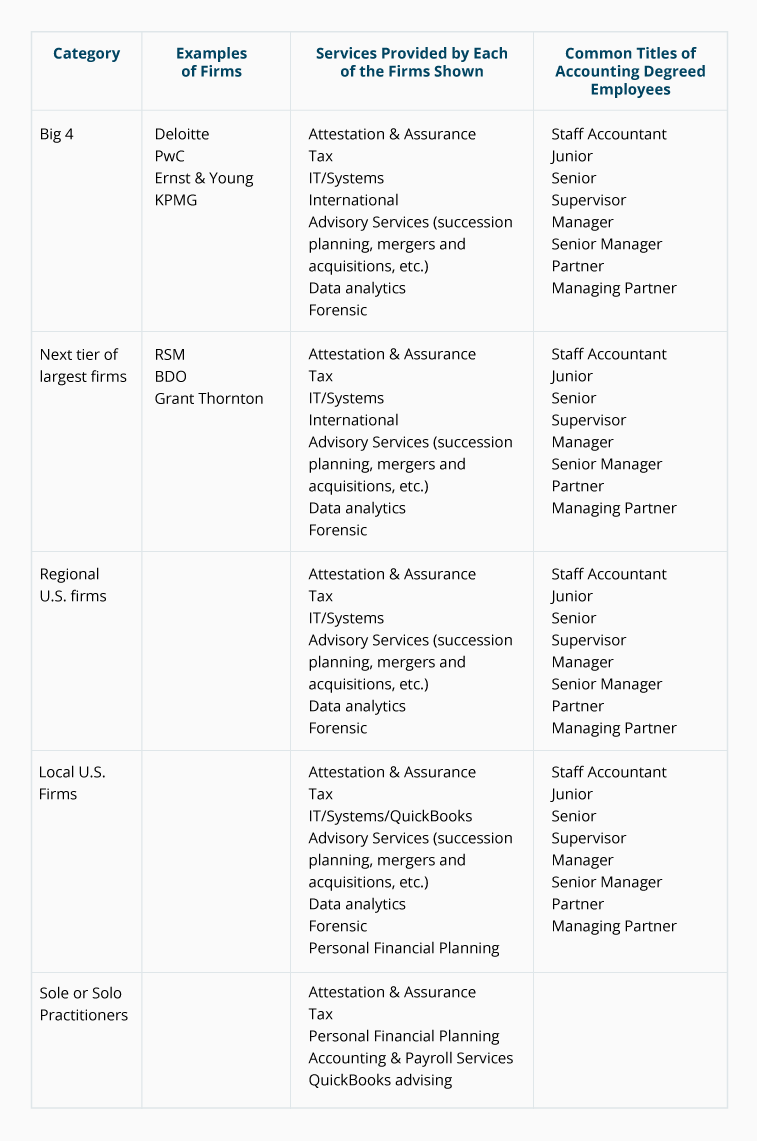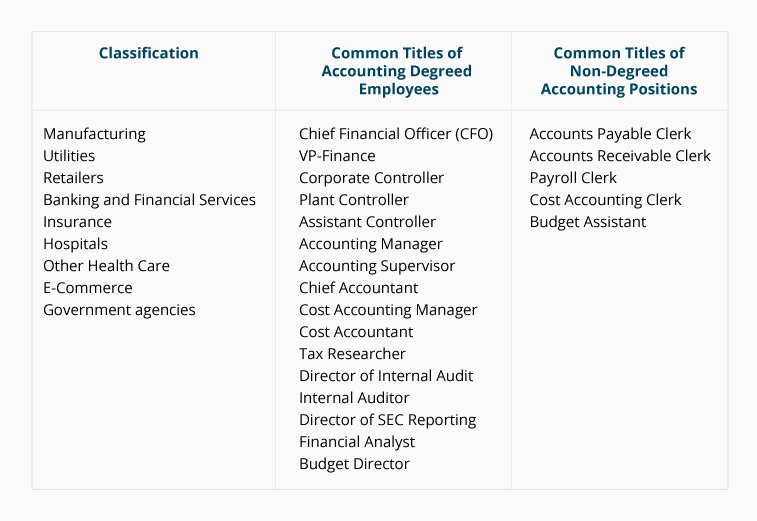Introduction to Accounting Jobs and Opportunities
There exists today a wide range of job opportunities in the field of accounting.
Entry-level jobs are dependent on the extent of your education. Positions of bookkeeper and accounting clerk, for example, require a high school diploma and perhaps a two-year associate degree in accounting. The position of accountant demands that you have a more thorough understanding of financial concepts and typically requires a minimum of a four-year bachelor’s degree in accounting. Some accountants go on to become certified public accountants (CPAs) as this provides more job opportunities. To become a CPA today, you will likely need to have 120-150 college credits including a degree in accounting, have professional accounting work experience, and pass the rigorous CPA Exam.
For purposes of our discussion, we’ve classified accounting jobs into four categories:
For each category, we’ll present some general information on salary, educational requirements, and types of employment opportunities.
What is a Bookkeeper?
Annual Salary Range
Full-time: $27,000 to $45,000+
The salary range reflects differences in job responsibilities, the size and type of employer, and the supply and demand for bookkeepers in a given geographic area. (General salary information is available at the U.S. Bureau of Labor Statistics.)
Educational Requirement
Some bookkeepers enter the work force with a two-year associate degree in accounting, while others enter with a high school diploma and an expectation that the employer will provide on-the-job training. If you are hired as a bookkeeper, you should assume that you will need some experience (either formal or on-the-job) in the use of accounting software. Generally, bookkeepers are not expected to have a four-year degree in accounting.
Note:
If you are new to bookkeeping or need a refresher, AccountingCoach offers explanations,
video training, practice quizzes, quick tests, Q&A and 10 certificates of achievement for topics such as:
- Debits and credits
- Adjusting entries
- Financial statements
- Payroll accounting
- Bank reconciliation
- Financial ratios, and more
All are included in AccountingCoach PRO.
We also recommend you use other online resources to become familiar with QuickBooks and electronic worksheets.
Who Hires Bookkeepers?
Bookkeepers are typically employed by companies that do not need or have the means to employ an on-staff accountant. These companies hire a bookkeeper to handle a range of routine financial activities, such as payroll, billing, and purchases. (Small manufacturers, retail stores, distributors, large law offices, small accounting firms, and not-for-profit entities are examples of such companies.) When some tasks require an accountant, the company typically will use an outside accounting firm for the services it needs.
Types of Tasks and Responsibilities
Effective bookkeepers are detailed-oriented, accurate, and efficient with a range of basic financial tasks. A bookkeeper is expected to handle large volumes of routine financial transactions in areas such as sales, purchases, and payroll and to generate/handle the documents associated with these transactions. For example, a purchase made by a company may include a purchase order, a receiving ticket, the supplier’s invoice, and payment to the supplier. A bookkeeper’s duties may also include the generation of internal financial reports.
A bookkeeper’s work may be reviewed by someone inside the company, or by the company’s outside accountant.
Future Needs
The affordability of computers and software means that employers will seek bookkeepers who are proficient in accounting/business software. With new technologies and software, small businesses will give preference to hiring bookkeepers who can adapt to changes in computing systems.
What is an Accounting Clerk?
Annual Salary Range
Full-time: $27,000 to $45,000+
The pay range reflects differences in job responsibilities, the size and type of employer, and the supply and demand for accounting clerks in a given geographic area. (General salary information is available at the U.S. Bureau of Labor Statistics.)
Educational Requirement
Some accounting clerks enter the work force with a two-year associate degree in accounting, while others enter with a high school diploma and an expectation that the employer will provide on-the-job training. Generally, accounting clerks are not expected to have a four-year degree in accounting.
Types of Tasks and Responsibilities
Companies large enough to have one or more accountants on staff often hire accounting clerks to assist the accountants with routine tasks. Unlike a bookkeeper who performs a range of basic financial tasks, the accounting clerk, payroll clerk, accounts payable clerk, accounts receivable clerk, inventory clerk, and cost accounting clerk have more focused responsibilities.
For example, the duties of an accounts payable clerk at XYZ Company may be to compare the information on each supplier’s invoice to the information on XYZ’s corresponding purchase order and receiving ticket. If the information on these documents is consistent, the supplier’s invoice is sent forward for payment. If the information is not consistent, the accounts payable clerk must resolve the differences before sending the invoice forward for payment.
What is an Accountant?
Annual Salary Range
Full-time: $40,000 to $80,000+
The salary range reflects differences in job responsibilities, the size and type of employer, and the supply and demand for accountants in a given geographic area.
Educational Requirement
Accountants are expected to have a bachelor’s degree in accounting from a four-year college or university. Of the 120 semester credits needed for the degree, approximately 30-36 of these credits will be in accounting courses such as introductory, intermediate, and advanced financial accounting, cost accounting, income tax, auditing, and accounting systems. Also required within the 120 credits are business courses such as organizational behavior, human resources, marketing, business statistics, computer systems, business law, economics, and administrative policy.
While a bachelor’s degree in accounting will qualify you to be an accountant, it may or may not qualify you to become a licensed certified public accountant (CPA). Many states are adding an alternative pathway besides a 150-credit degree or masters degree. The alternative is a bachelor’s degree in accounting with two years of experience and passing the CPA Exam.
Learn more about choosing a College or University
Membership Associations
Accountants can join national organizations with local chapters such as the Institute of Management Accountants, Institute of Internal Auditors, Accounting & Financial Women’s Alliance, National Association of Black Accountants, and others.
Who Hires Accountants?
Many companies are sufficiently large and complex to require the ongoing expertise of an in-house accountant. As an accountant, you may find yourself working for a manufacturer, hospital, bank, insurance company, brokerage firm, or any one of the many other types of businesses. Accountants are also employed by U.S. government agencies such as the Internal Revenue Service (IRS), Federal Bureau of Investigation (FBI), Securities and Exchange Commission (SEC), and the Government Accountability Office (GAO). State government agencies and large not-for-profit organizations also hire accountants.
Tasks and Responsibilities
Being proficient in finance and accounting is just one dimension of being a successful accountant. Therefore, an employer strives to hire an accountant who, in addition to demonstrating excellent accounting skills, has the following traits:
- Pays close attention to details, but does not lose sight of how details affect the bigger picture
- Is a problem solver and a strategic thinker
- Has a productive curiosity about business systems (why a company is profitable, how it attracts new customers, etc.)
- Has good listening skills
- Can communicate complex financial information in a clear, straightforward manner
- Works well as a member of a team
- Can supervise and develop subordinates
Some accountants are generalists, while others prefer to specialize in a given area. For example, if you are hired as a cost accountant (or cost accounting manager) at a manufacturing company, you might supervise several cost accounting clerks who calculate the costs of products manufactured, prepare cost estimates for potential sales of new products, and monitor the cost of raw materials, labor, and overhead.
Or, you might be responsible for maintaining the general ledger and preparing financial statements that comply with generally accepted accounting principles. In this role you might supervise an accounts payable clerk and payroll clerk, and your title might be general ledger accountant, chief accountant, corporate accountant, accounting manager, or corporate controller.
At larger and more complex companies, some accountants may have titles such as internal auditor, coordinator of profit plans and budgets, researcher of accounting and tax issues, financial analyst, or tax accountant.
Future Needs
As the world becomes more interconnected via global systems and international commerce, the need increases for accountants to be knowledgeable in international accounting standards as well as new technologies that assist management in making decisions. In short, accountants will need to be life-long learners who work closely with people in marketing, production, information technology, and e-commerce.
What is a Certified Public Accountant (CPA)?
Annual Salary Range
Full-time entry level: $50,000 to $75,000
Full-time with several years of progressive experience: $100,000+
The entry-level salary range will vary by industry, geographic location, and other factors. You can obtain more detailed information concerning starting salaries from the career services or placement office of the college or university that you plan to attend.
Increases in annual salary will depend on your professional growth. If you are an effective supervisor, work well with fellow employees and clients, and know how to improve profits, your salary increases can be significant. Annual salaries of experienced CPAs can be in excess of $100,000. Some CPAs with more than 10 years of continuously increasing responsibility can earn more than $200,000 per year.
Education Requirements
State boards of accountancy require new CPAs to have a minimum of 120-150 college credits of which some must be in specified accounting and business courses. Check with your state’s board of accountancy for its requirements. Reputable colleges and universities likely have accounting programs designed to meet their state’s requirements.
To become a licensed CPA, you must also pass the rigorous CPA Exam. Therefore, you should select a college or university with a rigorous accounting program that will prepare you for the challenge.
Learn more about choosing a College or University
Requirements for Becoming a Licensed CPA
After you’ve passed the CPA Exam, your state’s board of accountancy will verify that you have the appropriate college degree and accounting courses, and the required year or years of professional accounting experience. Once licensed, you will be required to earn professional continuing education credits to maintain your license. Again, check with your state’s board of accountancy for specifics.
Find your State Board of Accountancy
Membership Associations
In addition to the organizations available to non-CPA accountants, a CPA is eligible to join its state society of CPAs and the American Institute of Certified Public Accountants (AICPA).
Who Hires CPAs and Soon-to-be CPAs?
Before you can become a licensed CPA, you must pass the CPA Exam, and acquire the necessary work experience. Fortunately, many companies and accounting firms hire recent college graduates with accounting degrees who have the ability to become CPAs. These employers recruit students with high grade point averages from well-respected accounting programs, since they are most likely to pass the challenging CPA Exam.
Major employers of CPAs (and soon-to-be CPAs) include:
-
CPA firms. These range from a small one-office firm, to regional multi-office firms, to large international firms with offices in major cities throughout the world.
-
Companies such as manufacturers, banks, insurance companies, as well as government agencies, large not-for-profit organizations, e-commerce, and more.
Tasks and Responsibilities during the First Year at CPA Firms
In order for a CPA firm to be profitable, its CPAs must be highly focused individuals who can successfully complete tasks within a reasonable amount of time. CPAs are often billed out to clients using a per-hour billing rate, and clients will not pay high fees for CPAs who spend an unreasonable amount of hours completing the necessary tasks.
Some larger CPA firms assign newly hired college graduates to work in their tax departments or advisory services area. More common, however, is for firms to start new hires in the auditing area where they audit a client’s records with a team comprised of a supervising or senior accountant, a manager, and one of the firm’s partners.
Smaller CPA firms generally perform relatively few audits and could result in a more varied workload for the new hire. Responsibilities in a smaller CPA firm might include: reviewing a business client’s financial statements, assisting with the client’s accounting system, preparing a business tax return, preparing the business owners’ personal tax returns, and tax planning.
Most CPA firms have a “busy season” which occurs during the months of January through April. The reason for this is that many clients are businesses with an accounting year ending on December 31. In addition, clients who are individuals need their personal tax documents completed by the IRS deadline of April 15. Some CPA firms try to “smooth out” their annual workload by adding clients with fiscal years that end in months between May and October. For example, school districts and some businesses and nonprofits have accounting years that end on June 30.
If you are a recent hire who is planning to take the CPA Exam, the less busy months of May through December will be more conducive for studying for the exam.
After the First Year at CPA Firms
After one year at a CPA firm, you may be assigned to work with new clients as well as the clients you know from your first year. The firm’s goal is to deepen and broaden your range of experiences while offering clients efficient and professional service. Each subsequent year you are with the firm, you can expect more and diverse responsibilities in areas such as audit planning, supervising the work of other auditors and accountants, increased client contact, and additional training.
Tasks and Responsibilities at non-CPA Firms
Not every CPA wants to work as a public accountant. Some prefer to work as employees of companies involved in e-commerce, manufacturing, banking, and insurance. Others choose to be employees of government agencies or not-for-profit organizations. These accountants may have obtained their CPA license to have more work options and/or to distinguish themselves from other accountants.
Some CPAs choose to be employees of large corporations with common stock that is publicly traded. Some of these accountants specialize in complying with the unique and complex reporting requirements of various local, federal (SEC, IRS), and international authorities as well as stockholders and others.
Many accounting graduates begin their careers in public accounting, gain valuable experience, obtain their CPA license, and then leave public accounting. Some will work for businesses or not-for-profit organizations, some become entrepreneurs, and others gain additional education and become accounting professors.
Future Needs
As the world becomes more interconnected via global systems and international commerce, the need increases for CPAs to keep current with both domestic and international accounting standards. CPAs must also keep current with new technologies that assist management in making decisions.
Accounting Jobs at CPA Firms
The following table provides examples of the accounting job opportunities at large and small CPA firms:
Corporate Accounting Jobs
The following table lists some examples of the many accounting opportunities outside of public accounting that are available to people with various levels of accounting education:
Getting Hired
Regardless of the accounting position you seek, here are some suggestions to better prepare yourself:
Before You Need a Job
-
Continually improve yourself. Small consistent improvements add up. For example, if you are not familiar with accounting software, learn QuickBooks and electronic worksheets.
-
Network. Join a professional organization and begin networking in advance of the need to find a job.
-
Get the experience that employers look for.
-
Learn basic etiquette. Improve your manners and other social skills before you have lunch with a potential employer.
When Seeking a Job
-
Let the people in your network know that you are searching for a new position.
-
Use your school’s placement office. Even if you have already graduated, your college is likely to assist its alumni as well as its current students.
-
Use the Internet to learn more about the types of positions that are available.
-
Search within to determine who you are and what your calling in life might be. Where do you find personal satisfaction and joy?
When Interviewing
-
Be prepared. Use the Internet to learn all you can about the organization.
-
Review and refresh your understanding of accounting by using the materials available on AccountingCoach.com.
-
Look your best. Make sure your appearance is consistent with the image the company wants to project to its clients or customers.
-
Project an air of confidence. Give a firm handshake, look the interviewer in the eye, and use proper grammar. Let the interviewer know why you want to work for this company.
-
Be grateful. Thank the interviewer for the meeting and express your continued interest in the organization.
After the Interview
-
Follow up immediately with a letter thanking the interviewer for the opportunity to discuss the position available. Be sure you reiterate your interest in the company.
-
You can expect to receive a letter or other communication from the interviewer stating that you 1) received the job, 2) have been granted a second interview, or 3) have been rejected for the position. If you have not been contacted, be certain to contact the interviewer. Showing interest in the position and the organization will be well received.






